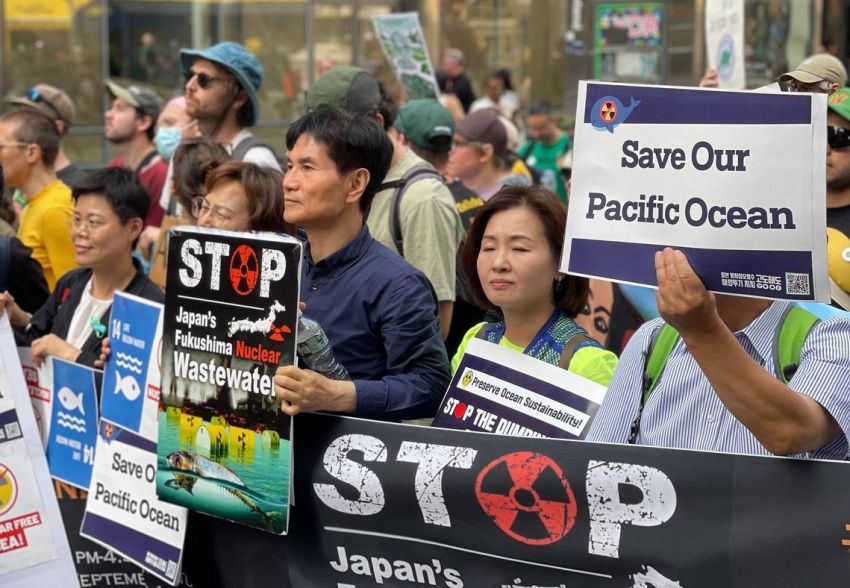
Ahead of the United Nations Sustainable Development Goals Summit on September 18–19, thousands of people in 16 cities across 8 countries gathered to call on the UN and governments to stop Japan's discharge of nuclear waste into the Pacific Ocean.
Protests took place in Germany (Berlin, Frankfurt, and Bochum), the United States (New York, Los Angeles, Boston and Seattle), South Korea (Seoul and Busan), Japan (Nagoya and Tokyo); Indonesia (Jakarta), Australia (Sydney and Melbourne); Switzerland (Zurich) and Wales (Aberystwyth).
The New York rally delivered the Global People’s Joint Statement, signed by more than 2.1 million people around the world, to the UN. The statement will be formally presented in September.
Three South Korean politicians, Lee Yong-sun and Lee Soo-jin of the Democratic Party of Korea and Kang Eun-mi of the Justice Party, who participated in the New York rally on September 16 and the Global Climate March on September 17, called for the United Nations and governments to call on Japan to stop discharging nuclear waste.
Citing the examples of Massachusetts and New York, which this year banned the discharge of contaminated water into Cape Cod Bay and the Hudson River, respectively, Lee suggested that "US politicians should actively respond to the issue of contaminated water from Japanese nuclear power plants at the state and federal levels.
"We call on the Japanese government to stop illegally discharging nuclear contaminated water into the ocean," said Representatives Lee Yong-seon of the Democratic Party of Korea and Kang Eun-mi of the Justice Party, adding that "attention and action by the international community, including the United States, ahead of the UN Sustainable Development Goals summit, can stop the illegal discharge of nuclear contaminated water into the ocean."
Cameron Murphy, a Labor MP in the New South Wales Parliament in Australia sent a video message of encouragement to the Sydney rally.
A Welsh parliament member Rhodri Mabon ap Gwynfor, who sent a complaint letter to the Japanese ambassador in the UK, said “It is with great concern that we hear of the Japanese government’s intention to release millions of gallons of radiated water back to the sea. Both the sea and the air connect all living beings on earth, and polluted radioactive water from the Fukushima Daiichi plant will inevitably find its way to each corner of the world. This therefore is a global concern”
The New York and LA rallies heard the desperate voices of fishermen, parents, and youth..
"The damage to the Korean people caused by the Japanese government's dumping of nuclear waste has already begun," said Kim Young-cheol, executive director of the National Fishermen's Association, who joined the New York rally. "We strongly urge the international community to make efforts to prevent our common sea from groaning under the weight of radioactivity."
"We have been campaigning against TEPCO's ocean dumping of Fukushima nuclear waste for over a year," said Jenny Carrington, CEO of We Are Mother Earth who joined the LA rally. "We call on the Japanese government and TEPCO to think of all humanity and future generations and stop dumping in the ocean now and find another way."
Hendra Wiguna, General Chair of Indonesian Youth and Coastal Students (the youth wing of KNTI), “It is certain that “the bad material” thrown into the sea will return to us because the sea is a source of goodness, a source of shared prosperity. "All nations should protect the sea so that our food is protected forever," explained Hendra.
World-renowned author Trina Paulus, who joined the New York rally despite her advanced age of 92, said, "We call on South Korea to firmly oppose Japan's maritime dumping, on Japan to find alternatives to maritime dumping, on the citizens and governments of the world to support the demands of those gathered here, and on the UN Conference to persuade nations to abandon war at sea and pursue peace."
"Japan is setting a dangerous precedent for other countries to use the ocean as a dumping ground for nuclear waste," said Eban Goodstein, a vice-president of Bard college in New York State, adding that the Biden administration should demand an immediate end to Japan's environmental crime of discharging nuclear contaminated water into the ocean.
Peter Boyle from Socialist Alliance in Australia condemned the Labor party of Australia for endorsing the dumping of the Fukushima nuclear waste as “safe”. The Australian Embassy in Tokyo even staged a “Fukushima fish and chips” dinner as a public relations stunt in support of the nuclear wastewater release. Boyle said the Australian government was a “bad Pacific neighbor” because it is undermining a nuclear-free Pacific by supporting the dumping of nuclear waste, dumping nuclear waste on Aboriginal land and entering the AUKUS nuclear submarine deal.
"We cannot allow barbaric nuclear waste to enter the peaceful Pacific Ocean," said Choony Kim, Secretary General of the Korean Federation of Environmental Movements (KFEM)/FoE Korea, and suggested that people from all walks of life around the world organize citizen candlelight vigils to call on local lawmakers, federal lawmakers, governors, presidents, the United Nations and relevant agencies to oppose Japan's ocean dumping.
"This global candlelight vigil is significant because it is the first time that anti-nuclear, ocean protection, and peace movements from eight countries have come together to speak with one voice," said Denise KH Yoon, Executive Coordinator of the Global Candlelight Vigil to Stop the Dumping of Nuclear Contaminated Water at Sea in Japan. "I expect that this joint action will build international solidarity to stop the dumping of nuclear contaminated water at sea and ultimately keep people and the ocean safe from nuclear weapons."